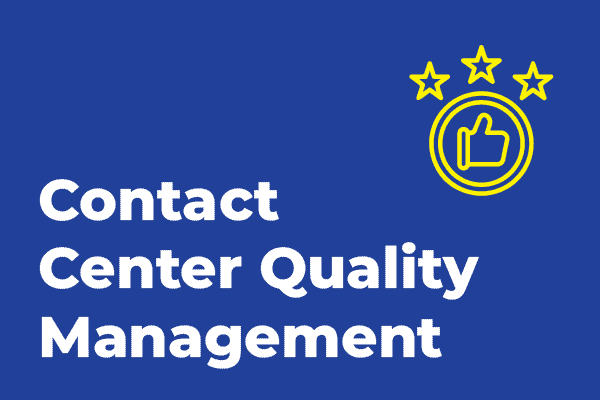As businesses strive to provide exceptional customer experiences, call centers have become an increasingly important part of the customer service strategy. Contact centers are responsible for handling customer inquiries and complaints while providing solutions.
Call center quality management (QM) is an essential process that helps businesses ensure their call centers are meeting customer expectations and delivering quality services.
This comprehensive article will dive deep into call center quality management. We will explore what it is, why it matters, and how businesses can improve customer satisfaction and agent performance through effective QM.
Rigorous quality management systems in call centers help ensure customers have the best possible experience, which not only strengthens your brand’s reputation but also leads to long-term customer loyalty. – Bradley Butler (Contact Center Software Consultant @ NobelBiz)
Key Takeaways:
- What Is Call Center Management?
- Why is Call Center Quality Management Important?
- How to Implement Effective Call Center Quality Management
- Call Center Management Best Practices
What is Call Center Quality Management?
Call center quality management is the process of monitoring, evaluating, and improving the service quality of a contact center business or department. It involves identifying areas that need improvement and implementing strategies to address those areas while measuring their effectiveness.
Using technology to record and analyze each and every customer encounter, developing and employing evaluation criteria, teaching and training agents, reporting and monitoring quality metrics are all part of call center quality management.
QM is crucial for businesses that want to provide exceptional customer service, as it ensures that customers get the help they need and that agents perform at their best. Businesses can improve customer satisfaction, increase customer loyalty, and reduce operational costs solely by focusing on quality.
If you still have doubts about the importance of quality management, consider that, according to Kaizo, 93% of consumers are more likely to make repeat purchases at companies with excellent customer service.
Why is Call Center Quality Management Important?
 Call center quality management is essential for several reasons. Firstly, it helps businesses identify areas that need improvement, whether agent training, process improvement, or technology updates. This, in turn, can lead to better customer experiences, increased customer loyalty, and reduced operational costs.
Call center quality management is essential for several reasons. Firstly, it helps businesses identify areas that need improvement, whether agent training, process improvement, or technology updates. This, in turn, can lead to better customer experiences, increased customer loyalty, and reduced operational costs.
Quality Management can also help businesses stay ahead of their competition. By providing excellent customer service, businesses can differentiate themselves from their competitors and build a loyal customer base.
Last but not least, QM helps businesses comply with regulatory requirements. Some industries, such as healthcare and finance, have strict regulatory requirements that call centers must adhere to. QM can help businesses ensure their call centers meet these requirements and avoid penalties and fines.
The Benefits of Effective Call Center Quality Management
Effective call center quality management can bring several benefits to businesses, including:
-
Improved Customer Satisfaction
By focusing on quality, businesses can provide better customer service, which leads to improved customer retention and satisfaction.
-
Increased Customer Loyalty
Satisfied customers are more likely to be loyal to a business, which can increase customer lifetime value. Customer retention is described as a contact center’s ability to keep its customers over time. Customer satisfaction is calculated in percentage terms by taking into account the number of consumers retained by a business at the completion of a given period.
This consideration is critical for ensuring the long-term viability of a brand’s turnover. Getting new customers is great, but holding them is much better!
-
Reduced Operational Costs
By identifying areas that need improvement, businesses can streamline processes and reduce operational costs.
Read more on What Makes a Successful Contact Center?
-
Compliance with Regulatory Requirements
Quality Management can help businesses ensure that their call centers meet regulatory requirements, reducing the risk of penalties and fines.
Effective call center quality management is essential for businesses that want exceptional customer service and to stay ahead of their competition. By defining quality standards, monitoring calls, evaluating performance, implementing improvement strategies, and measuring effectiveness, businesses can improve customer satisfaction, increase customer loyalty, and reduce operational costs. In addition, by following best practices and continuously improving, businesses can ensure that their call centers meet customer expectations and deliver quality services.
How to Implement Effective Call Center Quality Management
Effective call center quality management can be implemented by following some best practices and meeting a few prerequisites. First, it is important to employ professionals for call quality evaluation. These professionals should be trained to evaluate calls based on specific criteria and provide feedback to agents.
 Another thing that we saw is that rewarding and recognizing best practices for effective call center quality control can motivate agents to improve their performance. Also, investing time into coaching and training can help monitor call center quality effectively. Here are a few things to consider:
Another thing that we saw is that rewarding and recognizing best practices for effective call center quality control can motivate agents to improve their performance. Also, investing time into coaching and training can help monitor call center quality effectively. Here are a few things to consider:
- Working on small things, such as greeting customers with their names, can make a big difference in customer satisfaction.
- Spending 5 minutes (at most) reviewing yesterday’s calls can help identify areas of improvement.
- Getting customers involved in the process can also help improve customer experience and satisfaction.
- Appoint call center employees based on their customer service skills.
Implementing effective call center quality management requires a systematic approach. Here are some steps businesses can take to ensure that their QM process is effective:
- Define Quality: The first step in implementing QM is to define what quality means for your call center. This should be done by developing quality standards that agents must meet. These standards should be specific, measurable, achievable, relevant, and time-bound while being aligned with the business’s goals and objectives.
- Monitor Calls: The next step is monitoring calls to ensure that agents meet the quality standards. This can be done through call recording and reviewing the recorded calls. It is essential to ensure that monitoring is done objectively and consistently to avoid bias.
- Evaluate Performance: Once calls have been monitored, the next step is to evaluate agent performance. This involves reviewing the calls and providing feedback to agents on their performance. Feedback should be specific, constructive, and actionable.
- Implement Improvement Strategies: Based on the evaluation, businesses can identify areas that need improvement and implement strategies to address those areas. This could include agent training, process improvement, or technology updates.
- Measure Effectiveness: The final step is to measure the effectiveness of the improvement strategies. This can be done by monitoring calls again after the changes have been implemented and comparing the results with the previous ones. If the results show an improvement, the changes were effective; if not, adjustments must be made.
Now, implementing an efficient quality management system is no walk in the park, and the statistics are here to show it. According to llcbudy.com, 85% of contact centers say they struggle to find the time for quality assurance, and 61% say that insufficient technology is a barrier to their QM success. However, the benefits clearly outweigh the hassle of having to implement QM within any contact center.
If you, too, want to reap the benefits of a well-oiled quality management system but don’t have the time to set it up, NobelBiz is here to help. Get in touch with one of our experts and leave it to us.
Before we move forward to outlining the benefits of QM, let’s have a quick look at what are some common mistakes when implementing a quality management system within a contact center.
Common mistakes
One common mistake in operating a quality management system within a contact center is using overly complex (or too long, for that matter) quality forms that are difficult to score. This can lead to inconsistent evaluations and missed opportunities for improvement.
Some other mistakes that we often see are skipping calibration, not training coaches properly, and overwhelming those who monitor and coach. This can all lead to negative outcomes such as burnout and inconsistent evaluations. To avoid these mistakes, contact centers need to ensure that:
- their quality forms are simple and clear,
- they provide enough coaching,
- their coaches and monitors are properly trained and calibrated,
- they don’t overwhelm those who monitor and coach.
Best Practices for Call Center Quality Management
Here are some best practices that businesses definitely should follow to ensure effective call center quality management:
Involve Agents:
Agents are on the front lines of customer service, so involving them in the QM process is crucial. This can be done by soliciting their feedback, involving them in developing quality standards, and providing regular feedback on their performance.
Use Technology:
 Technology can help streamline the QM process and make it more efficient. This could include call recording software, speech analytics, and quality monitoring software.
Technology can help streamline the QM process and make it more efficient. This could include call recording software, speech analytics, and quality monitoring software.
According to Christiana Jolaoso from Forbes, “for effective call center management, prepare to invest in technology”. Using contact center technologies like Nobelbiz, for instance, will complement the efforts of your call center agents.
According to CX Today, around 57 percent of customers from all generations now prefer to engage companies through digital channels. This is yet another clear indicator that the future of contact centers is omnichannel.
Omnichannel contact center solutions offer features like data management, call tracking, skill-based routing, ring groups, interactive voice response (IVR), and other tools you’ll need to provide both current and potential clients with the greatest customer service.
Be Consistent:
Consistency is key when it comes to QM. The quality standards should be applied consistently across all agents, and monitoring should be done objectively and consistently to avoid bias.
Focus on the Customer:
The ultimate goal of QM is to improve the customer experience. Therefore, businesses should focus on identifying areas that impact the customer experience and implement strategies to address those areas.
Track Contact Center Metrics:
The key to a successful quality management system in contact centers is to consistently track and measure performance. This helps identify areas of improvement and allows you to implement the necessary changes to optimize the customer experience. – Brad Butler (Contact Center Software Consultant @ NobelBiz)
To gather insight into the operations of your call center and make smart decisions, you have to monitor the relevant metrics. For call center quality management, you should track metrics such as:
- First Call Resolution (FCR) Rates: The First Contact Resolution Rate (FCR) is a crucial KPI for measuring the effectiveness and quality of your customer service. This indicator is regarded as one of the most influential metrics for measuring customer service effectiveness.
The percentage of client complaints that were handled or resolved by your agents at the first point of contact.
FCR = (Total Resolved Cases / Total Number of Cases) x 100
- Net Promoter Score (NPS): NPS or Net Promoter Score is a key performance indicator that shows if a customer is willing to recommend a brand’s service or product to a friend, family, or acquaintance. To put it simply, it answers the question, “Would you recommend this brand to someone? “, by choosing a score between 1 and 10.
NPS = % of Promoters – % of Detractors
- Customer Satisfaction (CSAT) Rates: The Customer Satisfaction Score is a popular metric used by call centers to assess buyer satisfaction and is effectively the percentage of customers whose needs and expectations are met on a scale of, say, one to five, with four and five being positive scores. CSAT is based on the customer’s emotions, as opposed to the NPS, which is intended to provide a more reasonable perspective. The customer satisfaction score aims to get feedback on specific topics such as products or services, quality of interactions with call center agents or after-sales support, purchase procedures, customer experience impression, and so on.
CSAT = (number of positive responses / the total number of responses) x 100.
In conclusion, call center quality management is critical to the success of any call center operation. By focusing on key areas such as reporting, analytics, coaching, and training, we can ensure that our clients’ call centers are operating at peak performance.
First, it’s important to establish clear objectives and expectations. This will help ensure that all customer service representatives have the same understanding of what constitutes excellent customer service and will help to create a unified customer experience.
Another key takeaway is that quality management should be a collaborative effort between customers, representatives, supervisors, and managers. This will help ensure that all stakeholders are aware of their responsibilities and are held accountable for delivering an optimal customer experience.
According to observe.ai, most contact centers, or 85%, want to upgrade or replace their quality management automation systems. Moreover, 87% of respondents presently find it challenging to provide quality management in a remote environment. If this is you, NobelBiz is here to help.
At NobelBiz, we understand the importance of providing excellent customer service and have developed a comprehensive call center quality management system that allows us to achieve this goal.
If you’re looking for a partner to help you improve the quality of your call center operation, look no further. Our team of experienced professionals can help you develop a customized quality management system that meets your unique needs and requirements.
Contact us today to learn how we can help you achieve your call center quality management goals.

Michael McGuire is a contact center industry expert with almost two decades of experience in the space. His experience includes roles as Director of Contact Center Digital Transformation at NobelBiz, and as Director of Operations at FLS Connect, managing multiple call centers. As President of Anomaly Squared and Targeted Metrics, Michael successfully transitioned companies into remote operations and significantly boosted revenues. With a strong background in customer service, leadership, strategic planning, and operations management, Michael excels in driving growth and innovation in the call center space.
Mike is also a proud Board Member for R.E.A.C.H Trade Group, promoting consumer protection and satisfaction and Co-host of the Off Skripted Podcast – a show about Life, Call Centers and everything in between.







